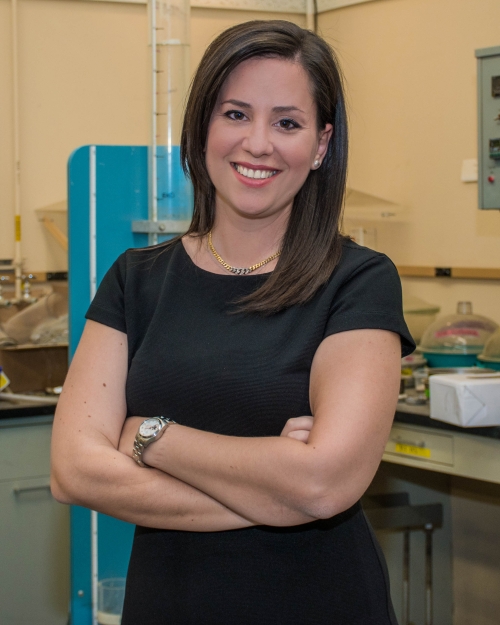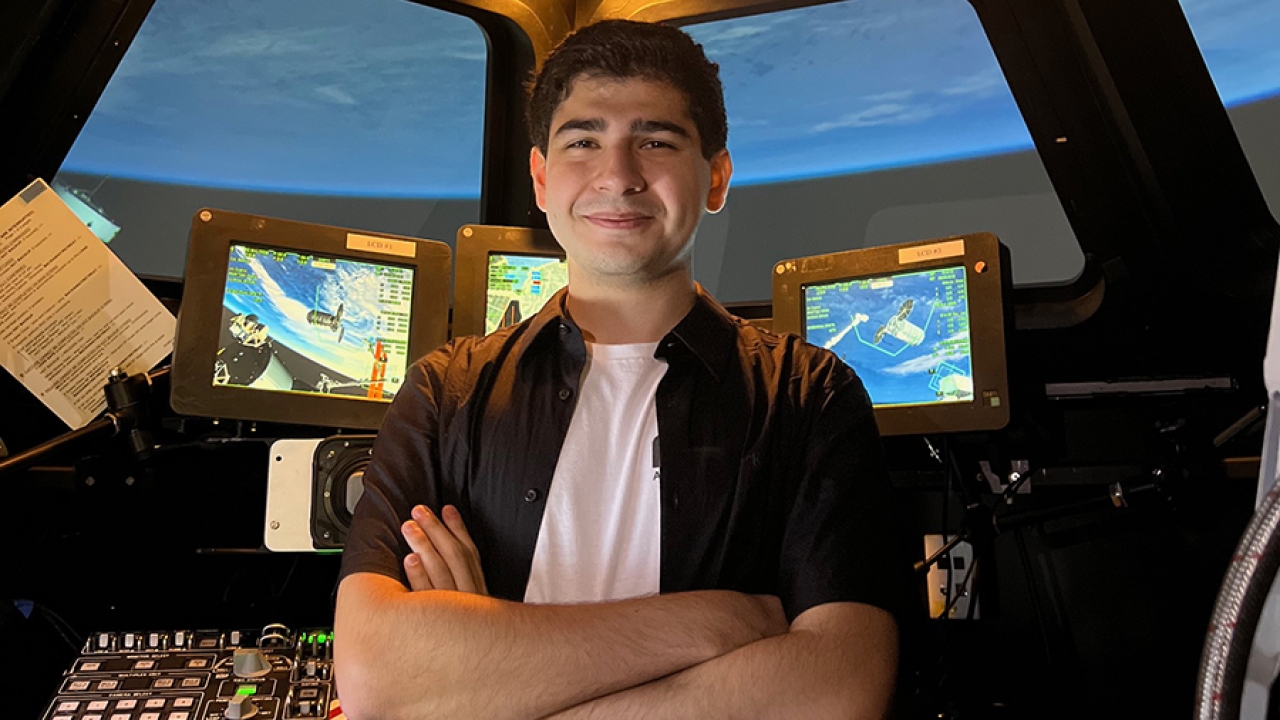An Earth Shattering Shift
Katerina Ziotopoulou, M.S. '10, Ph.D. '14 is consumed with the shifting of the world - both professionally and personally.

As an associate professor in the Department of Civil and Environmental Engineering, Ziotopoulou’s work is focused on developing tools to improve the way we gather data about and understand soil behaviors and the resilience of soil-structure systems during earthquakes.
Likewise, as a new mother, Ziotopoulou is now managing a complex, 24-hour schedule of feeding, changing and (sometimes) sleeping shifts with her husband as they co-manage the raising of their newborn son, Vasilis. All the while, Ziotopoulou, who just obtained tenure, must also serve as a mentor to students in her lab and continue serving her community, both within and outside of the university through her roles in numerous committees.
It is a juggling act that many women in academia face as the timelines for growing their careers coincides with their desire to grow their family. As challenging as it is at times, Ziotopoulou says it is a phase of her life that she is “choosing to embrace.”
“I am trying to keep my head focused on the good parts of being an academic and all the flexibility it allows me. I can invest in my personal life, even if it also means I sometimes work late into the night or on the weekends,” she said. “It doesn’t work for everyone, but I’ve found ways to make it work for me and my priorities.”
Interest in Engineering Stems from Desire to Help Others
A native of Greece, Ziotopoulou became interested in earthquakes after one shook her hometown of Athens in 1999. Her father was a civil engineer at the time and Ziotopoulou got to tag along with him as he met with people after the earthquake and assessed the damage.
“Up until that time, I hadn’t quite grasped the social aspect of helping people as a civil engineer,” she said. “But when I saw my father helping people after the earthquake, I said ‘Ah! That has an impact. You get to help people.’ That opened my eyes.”
She enrolled in the National Technical University of Athens and obtained an undergraduate degree in civil engineering, while her diploma thesis focused on geotechnical earthquake engineering. For her master’s and doctorate degrees, Ziotopoulou decided to give up the city life of Athens, travel across the Atlantic for the first time, and come to UC Davis because of “the top-notch research that exists here.”
After earning her Ph.D. in 2014, she taught at Virginia Tech for two years before returning to UC Davis to accept a tenure-track position in the Department of Civil and Environmental Engineering.
Understanding Soil During Seismic Activities
At UC Davis, Ziotopoulou and her research group work on computer simulation tools that allow engineers and scientists to better observe, understand, and predict soil behaviors during seismic activities.
“What we do is reduce the physical world into a one, two or three-dimensional representation wherein different equations represent the laws of physics,” she said. “Each component of the system—the soil or the structures— are also represented by equations. You then can apply different simulations to those equations and observe what happens under different scenarios.”
The simulations can then better, for example, inform foundation design and ground improvement methods. She and her team have produced tools that are currently widely used both by researchers and industry professionals nationally and internationally, toward assessing and managing risks associated with earthquake-induced ground failure.
For example, Ziotopoulou and team recently compiled the most detailed experimental data yet seen on how liquefaction-induced downdrag, a condition wherein soil settling after extensive liquefaction during an earthquake event can drag a pile downwards, can add to the structural load applied to a deep foundation during earthquake shaking. Their dataset was awarded a 2022 DesignSafe Dataset Award, recognizing the dataset's diverse contributions to natural hazards research, and also made publicly available on the NHERI DesignSafe cyberinfrastructure.
Earning National Recognition and Awards
For her work Ziotopoulou has earned national recognition including a 2021 Arthur Casagrande Professional Development award from the American Society of Civil Engineering. The annual award is given to one recipient under the age of 35 in recognition of outstanding accomplishments in geotechnical engineering.
She also received one of three 2018 Wakeham Mentoring Fellowships, an honor given to faculty and their mentees to support the exploration of mentoring best practices. Ziotopoulou sees mentorship and being there for her graduate students to be as important as being there for her son.
“I do believe a lot in the teaching mission of being on faculty. I’ve found a great home for teaching students here at UC Davis,” she said “My teaching experiences here have been very, very rewarding.”
One of the projects she is working on that she is most excited about is emerging research revolving around the integration of artificial intelligence into geotechnical engineering. It is work she is pursuing through an early career award she won in 2021 from the National Science Foundation. The five-year grant is intended to enable young faculty to pursue research that paves the way toward a lifetime of contributions, according to Ziotopoulou.
“In many ways an early career award will be successful if it creates more questions than it answers,” Ziotopoulou said. “My project in particular requires a lot of cross disciplinary work because you need knowledge from other fields to find solutions. So, I am very excited about the potential for that project to reshape more traditional geotechnical earthquake engineering approaches, as well as the opportunity to grow my skill sets as well as those of my students in the process.”
Ziotopoulou says she’s inspired to keep going, not just because she’s a woman in an engineering field and wants to lead by example, but more so because she’s simply fascinated by the work. “There’s never been a plan. I just enjoy my work, do my work, and keep my eyes open for what life throws my way,” she said. “If I were to do all this again, I would do it in the exact same way.”
This story was featured in the Fall 2022 issue of Engineering Progress.




